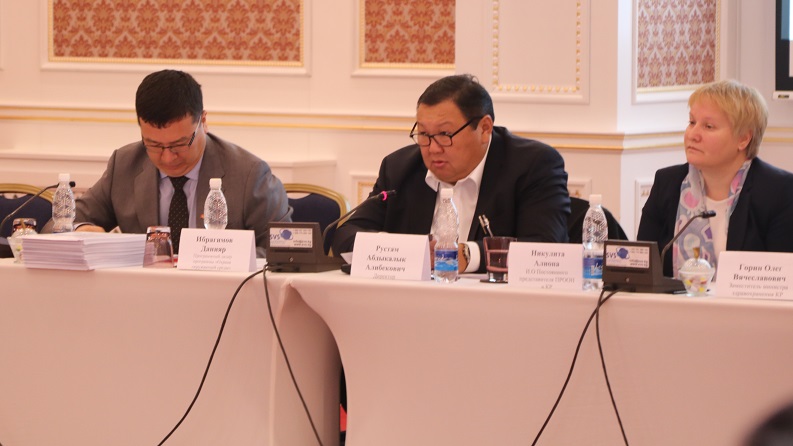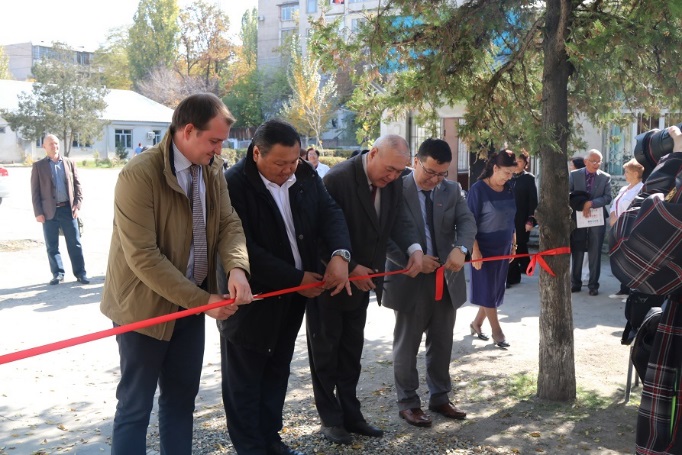News block
Kyrgyzstan reduces POPs emissions into atmosphere
Emissions of harmful persistent organic pollutants (POPs) in atmosphere during inappropriate medical wastes disposal is a relevant problem for the whole world and Kyrgyzstan does not stand apart. In 2005, the Kyrgyz Republic ratified the Stockholm Convention on POPs.
 What is real situation with POPs in Kyrgyzstan? Let us see some figures. In Kyrgyzstan, 142 in-patient facilities, 205 outpatient sites, 37 dental hospitals and 900 Feldsher-Midwife Stations (FMS) operate in the health care system. Annually, medical facilities provide 1 7000 vaccinations producing around 543 tons of medical wastes. Only in Bishkek, medical facilities use 357, 6 thousand of disposable syringes and 61, 9 thousand of disposable intravenous infusion systems that make up 24 tons of polymer wastes per month.
What is real situation with POPs in Kyrgyzstan? Let us see some figures. In Kyrgyzstan, 142 in-patient facilities, 205 outpatient sites, 37 dental hospitals and 900 Feldsher-Midwife Stations (FMS) operate in the health care system. Annually, medical facilities provide 1 7000 vaccinations producing around 543 tons of medical wastes. Only in Bishkek, medical facilities use 357, 6 thousand of disposable syringes and 61, 9 thousand of disposable intravenous infusion systems that make up 24 tons of polymer wastes per month.
Are there any environmental benign approaches of medical wastes disposal? How to deal with the annual increase of medical wastes? How to reduce use of mercury-containing medical equipment? What can be offered as mercury-free alternative?
 Kyrgyzstan Ministry of Health, the State Agency for Environmental Protection and Forestry and UNDP-GEF Project “Protect Human Health and the Environment from Unintentional Releases of POPs and Mercury from the Unsound Disposal of Healthcare Waste in Kyrgyzstan” joint their efforts to address these issues. The results of joint work were presented at the workshop entitled “Medical Wastes Management to Reduce Unintentional Emissions of POPs and Mercury in the Kyrgyz Republic”, October 17.
Kyrgyzstan Ministry of Health, the State Agency for Environmental Protection and Forestry and UNDP-GEF Project “Protect Human Health and the Environment from Unintentional Releases of POPs and Mercury from the Unsound Disposal of Healthcare Waste in Kyrgyzstan” joint their efforts to address these issues. The results of joint work were presented at the workshop entitled “Medical Wastes Management to Reduce Unintentional Emissions of POPs and Mercury in the Kyrgyz Republic”, October 17.
The Deputy Minister of Health Mr. O. Gorin says as a matter of priority, “the interdepartmental working groups were formed to develop regulations and a strategy of medical wastes management for 2017-2020. The project achieved almost all its results in 11 pilot health care facilities and 100 FMS of Chui and Issyk-Kul oblasts. To achieve sustainable results we together with UNDP-GEF Project undertake monitoring visits to these facilities.”
In Kyrgyzstan, implementation agency of the Stockholm Convention is the State Agency for Environmental Protection and Forestry under the Government of the Kyrgyz Republic (SAEPF). A.Rustamov, SAEPF Director, said the Agency together with UNDP-GEF developed the project “Protect Human Health and the Environment from Unintentional Releases of POPs and Mercury from the Unsound Disposal of Healthcare Waste in Kyrgyzstan”. The major task of the project is to deal with problems of unintentional emissions of POPs in atmosphere. “Only in 2003 the total volume of dioxin emissions made up 30.5 gram toxic equivalent caused by burning of waste of which medical wastes made up 7 gram toxic equivalent,” said A. Rustamov.
 In future development of new technologies will lead to emergence of more efficient and safe approaches to disposal of POPs and mercury wastes. Nevertheless, by opinion of Aliona Niculita, a.i. UNDP Resident Representative in the Kyrgyz Republic, today Kyrgyzstan makes efforts that allow both reducing unintentional emissions of POPs, providing social and economic benefits, improving safety of medical workers and people responsible for garbage management together with reducing risk contamination of patients and the population. To the present 11 pilot medical and preventive institutions of Bishkek and 100 Feldhser-Midwife Stations (FMS) use environmentally friendly approach in disposal of medical wastes. UNDP-GEF Project allotted over $261 844 for reconstruction, construction and equipment of 11 pilot institutions and $ 118 718 to equip 100 FMS with autoclaves. The official transfer ceremony was held at the Maternity Clinic No 1 of Bishkek city.
In future development of new technologies will lead to emergence of more efficient and safe approaches to disposal of POPs and mercury wastes. Nevertheless, by opinion of Aliona Niculita, a.i. UNDP Resident Representative in the Kyrgyz Republic, today Kyrgyzstan makes efforts that allow both reducing unintentional emissions of POPs, providing social and economic benefits, improving safety of medical workers and people responsible for garbage management together with reducing risk contamination of patients and the population. To the present 11 pilot medical and preventive institutions of Bishkek and 100 Feldhser-Midwife Stations (FMS) use environmentally friendly approach in disposal of medical wastes. UNDP-GEF Project allotted over $261 844 for reconstruction, construction and equipment of 11 pilot institutions and $ 118 718 to equip 100 FMS with autoclaves. The official transfer ceremony was held at the Maternity Clinic No 1 of Bishkek city.
Environmentally friendly technologies allow reducing unintentional POPs emissions in the public health sector and allow the country to comply with obligations under the Stockholm Convention.